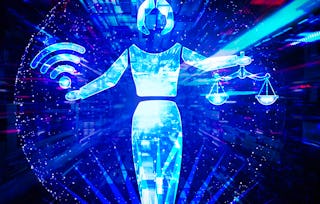Embark on a transformative journey through the digital age as we unravel the profound impact of technology on society. This engaging course delves into the core of the digital revolution, exploring its historical roots, societal implications, and the fascinating interplay between innovation and human values. During this course, you will be able to: understand the digital paradigm, explore emerging trends (like AI and large language models (LLMs)), navigate ethical considerations, analyze the digital revolution, understand artificial intelligence (AI), comprehend societal impact, prepare for the future and anticipate the technological singularity!

Digital Thinking: Frameworks For Our Digital Reality
6 days left! Gain next-level skills with Coursera Plus for $199 (regularly $399). Save now.

Digital Thinking: Frameworks For Our Digital Reality
This course is part of Digital Technology and Social Change Specialization

Instructor: Martin Hilbert
Included with
(13 reviews)
Skills you'll gain
Details to know

Add to your LinkedIn profile
5 assignments
See how employees at top companies are mastering in-demand skills

Build your subject-matter expertise
- Learn new concepts from industry experts
- Gain a foundational understanding of a subject or tool
- Develop job-relevant skills with hands-on projects
- Earn a shareable career certificate

There are 4 modules in this course
After this module, you will be able to define the digital paradigm and assess the digital paradigms impact on various societal aspects, including economics, information distribution, and decision making. You will be able to apply innovation theory to analyze and discuss the transformations brought about by the shift to a digital paradigm in industries, societal structures. You will begin to analyze the historical progression of technological paradigms, emphasizing the mastery of matter (stone age), transformation of energy (industrial age), and the current focus on information (digital age). Lastly, you'll be able to begin to develop critical evaluation skills by assessing the impact of technology on fundamental aspects of human life (basic needs, safety, education, relationships).
What's included
9 videos1 reading1 assignment2 discussion prompts
At the end of this module, you will be able to explain the significance of digital trends in the evolution of technology and be able to explore recent advancements in digital technology. You'll discuss how these digital trends shape the digital paradigm and influence various aspects of society. You will explore ethical considerations and potential downsides associated with artificial intelligence, recommender algorithms, communication networks, and the massive storage of digital footprints, demonstrating a nuanced understanding of the ethical implications of persuasive technology. You will be able to examine the role of individuals and society in shaping technology and assess how aligning technological advancements with human values can mitigate potential negative consequences. You will join the discussion on how to ethically manage our currently ongoing socio-technological co-evolution and you will develop a comprehensive understanding of the interplay between technological evolution and social change, examining how society evolves in tandem with technological advancements.
What's included
6 videos2 assignments2 discussion prompts
After this module, you will be able to discuss the fundamental components of the digital revolution, including the ongoing evolutionary development from societal digitalization of reality to its algorithmification and explore real-world applications of the digital revolution, investigating how data, communication, and algorithms address global challenges, reaching from sustainable food production to reorganizing the taxi (Uber) and music industries (Spotify). You'll be able to analyze the influence of major technology companies like Apple and Google in shaping the digital landscape and understand their economic power in hardware, software, and user interfaces, and grasp their role in the co-evolution of the digital age. You will learn the stages of the digital transformation process and explore the connection of databases, creation of digital twins, and the use of theoretical simulations for data-driven decision-making. Finally, you'll be able to investigate how traditional industries, including mining, are adapting to digitalization and algorithmification and understand the challenges and opportunities these industries face in integrating data, optimizing processes, and leveraging digital twins for improved efficiency.
What's included
9 videos1 assignment1 discussion prompt
In this module, you will embark on a captivating journey through the realms of artificial intelligence (AI) and its profound impact on our world. By delving into key historical milestones and understanding the evolution from traditional knowledge processes to the machine learning paradigm, you will gain insights into what drives the current excitement surrounding AI. By the end of this module, you will not only possess a comprehensive understanding of AI and its historical context but also be equipped to critically analyze its future impact on humanity.
What's included
9 videos1 assignment2 discussion prompts
Earn a career certificate
Add this credential to your LinkedIn profile, resume, or CV. Share it on social media and in your performance review.
Instructor

Offered by
Explore more from Governance and Society
 Status: Free Trial
Status: Free TrialUniversity of California, Davis
 Status: Free Trial
Status: Free TrialIIMA - IIM Ahmedabad
 Status: Free Trial
Status: Free TrialPolitecnico di Milano
 Status: Free Trial
Status: Free TrialUniversity of California, Davis
Why people choose Coursera for their career




Frequently asked questions
To access the course materials, assignments and to earn a Certificate, you will need to purchase the Certificate experience when you enroll in a course. You can try a Free Trial instead, or apply for Financial Aid. The course may offer 'Full Course, No Certificate' instead. This option lets you see all course materials, submit required assessments, and get a final grade. This also means that you will not be able to purchase a Certificate experience.
When you enroll in the course, you get access to all of the courses in the Specialization, and you earn a certificate when you complete the work. Your electronic Certificate will be added to your Accomplishments page - from there, you can print your Certificate or add it to your LinkedIn profile.
Yes. In select learning programs, you can apply for financial aid or a scholarship if you can’t afford the enrollment fee. If fin aid or scholarship is available for your learning program selection, you’ll find a link to apply on the description page.
More questions
Financial aid available,





